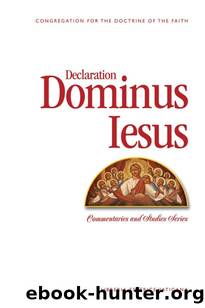Declaration Dominus Iesus by Libreria Editrice Vaticana

Author:Libreria Editrice Vaticana [Vaticana, Libreria Editrice]
Language: eng
Format: epub
Publisher: United States Conference of Catholic Bishops, USCCB
Published: 2012-03-13T04:00:00+00:00
Conclusion
Various theological questions are closely connected to the unicity of the economy of salvation, which is centered on the incarnation. First of all, the universal mediation of Jesus, to which the Declaration Dominus Iesus dedicates an entire chapter. But on the other hand, it is only if we affirm this single economy that we can consider all people as called to one and the same salvation. Different paths, in this case, could only lead to different destinations, because there is an intimate connection between the mediator of salvation and salvation itself. In the New Testament, this is contemplated as participation in the life of Jesus, and concretely in the life of his glorified humanity (among many other texts, see Lk 23:43; Jn 14:1-3, 17:24-26; Rom 8:17, 29; 1 Cor 15:45-49; Eph 1:3-14, 2, 6; Phil 1:23; Col 3:1-4). Only because Christ died and rose for us, and through the action of his Spirit, can we arrive at full conformation to him. And at the same time, it is only with the mediation of Jesus Christ that we can come to the Father. Neither the New Testament nor the Tradition of the Church knows any other way.
We can finish our reflections with the same words that end Chapter 2 of the Declaration Dominus Iesus: âIn conclusion, the action of the Spirit is not outside or parallel to the action of Christ. There is only one salvific economy of the One and Triune God, realized in the mystery of the incarnation, death, and resurrection of the Son of God, actualized with the cooperation of the Holy Spirit, and extended in its salvific value to all humanity and to the entire universeâ (Dominus Iesus, no. 12, par. 6).
_________________
1 Interreligious dialogue cannot replace the proclamation of the good news to all peoples; nonetheless it has been encouraged by the recent Magisterium of the Church, because it is part of its mission of evangelization. See John Paul II, Redemptoris Missio, nos. 4; 11; 55-57.
2 It is clear that the declaration cannot enter into the concrete description of each of the many opinions that are implicitly taken into consideration. So this paragraph, like the one after it, summarizes and groups together positions that differ in their individual details. Nor can we undertake this description. For extensive information on the recent debate on these topics, see A. Amato, âLâassolutezza salvifica del Cristianesimo: prospettive sistematiche,â in Seminarium vol. 38 (1998), 771-809; G. Iammarrone, âLa dottrina del primato assoluto e della signoria universale di Gesù Cristo nel dibattito attuale sul valore salvifico delle religioni,â in I. Sanna (ed.), Gesù Cristo speranza del mondo. Miscellanea in onore di Marcello Bordoni, Rome, 2000, 339-408.
3 We will leave aside the question of the relationship between the Church and the salvation of non-Christians, because this is dealt with in detail in Chapter 4 of the declaration. It must also be noted that some of the authors who distinguish the salvific action of the eternal Word from that of the Incarnate Word do not
Download
This site does not store any files on its server. We only index and link to content provided by other sites. Please contact the content providers to delete copyright contents if any and email us, we'll remove relevant links or contents immediately.
Christian Ethics by Wilkens Steve;(860)
Christian Ethics for a Digital Society by Kate Ott(779)
Fearfully and Wonderfully Made by Philip Yancey & Paul Brand(771)
God and the Multiverse by Victor J. Stenger(677)
Numbers by Ronald B. Allen(641)
How to Read Slowly by James W. Sire(618)
Christian Ethics: An Introduction to Biblical Moral Reasoning by Wayne Grudem(598)
The City of God by Saint Augustine & Marcus Dods(592)
Morality by Jonathan Sacks(570)
Monastic Archaeology by Unknown(568)
The Technological System by Jacques Ellul(552)
Amish Grace by Donald B. Kraybill & Nolt Steven M. & Weaver-Zercher David L(536)
Death of the Doctor by Unknown(529)
The Disabled Church by Rebecca F. Spurrier;(523)
Jesus: A New Vision by Whitley Strieber(523)
Children of Lucifer; The Origins of Modern Religious Satanism by Ruben van Luijk(513)
Critical Writings by Joyce James;(503)
Redeeming Sociology by Vern S. Poythress(488)
The Church in the Early Middle Ages by G.R. Evans(478)
